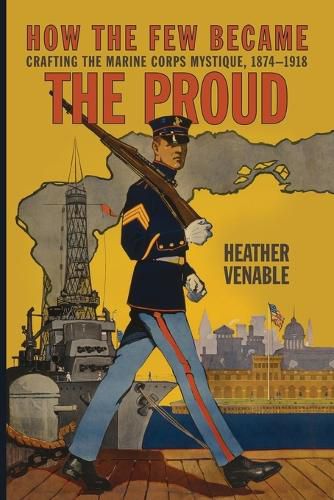Readings Newsletter
Become a Readings Member to make your shopping experience even easier.
Sign in or sign up for free!
You’re not far away from qualifying for FREE standard shipping within Australia
You’ve qualified for FREE standard shipping within Australia
The cart is loading…






For more than half its existence, the U.S. Marine Corps and its members largely self-identified as soldiers. In the early decades, being a Marine did not yet mean something distinct, either to Marines or to the public at large. The Corps' peculiar position resulted in a sort of identity crisis: Being neither a land-based organization like the Army nor an entirely sea-based one like the Navy, the Corps' role overlapped with both institutions. While the Army and Navy easily could define their respective domains, Marines inherently shouldered a more varied array of land-and-sea responsibilities.
Author Heather Venable argues that, since the Marine Corps could not readily rally around a sole defining mission, it turned instead to an image to ensure its institutional survival. As Marine officers immersed themselves in the Corps' historical records, they initiated a process by which a maligned group of nineteenth-century naval policemen eventually would come to be regarded as elite warriors. Embracing their storied past, fin-de-siecle Marines began to justify their existence by invoking their traditions, celebrating their many martial engagements, and claiming to be the nation's oldest and proudest military branch. A new and enduring institutional persona emerged-that of a fighting force ultimately superior to soldiers and sailors. Although there are countless works on the Marine Corps, How the Few Became the Proud is the first to explore the origin of the myths behind the mystique.
$9.00 standard shipping within Australia
FREE standard shipping within Australia for orders over $100.00
Express & International shipping calculated at checkout
For more than half its existence, the U.S. Marine Corps and its members largely self-identified as soldiers. In the early decades, being a Marine did not yet mean something distinct, either to Marines or to the public at large. The Corps' peculiar position resulted in a sort of identity crisis: Being neither a land-based organization like the Army nor an entirely sea-based one like the Navy, the Corps' role overlapped with both institutions. While the Army and Navy easily could define their respective domains, Marines inherently shouldered a more varied array of land-and-sea responsibilities.
Author Heather Venable argues that, since the Marine Corps could not readily rally around a sole defining mission, it turned instead to an image to ensure its institutional survival. As Marine officers immersed themselves in the Corps' historical records, they initiated a process by which a maligned group of nineteenth-century naval policemen eventually would come to be regarded as elite warriors. Embracing their storied past, fin-de-siecle Marines began to justify their existence by invoking their traditions, celebrating their many martial engagements, and claiming to be the nation's oldest and proudest military branch. A new and enduring institutional persona emerged-that of a fighting force ultimately superior to soldiers and sailors. Although there are countless works on the Marine Corps, How the Few Became the Proud is the first to explore the origin of the myths behind the mystique.